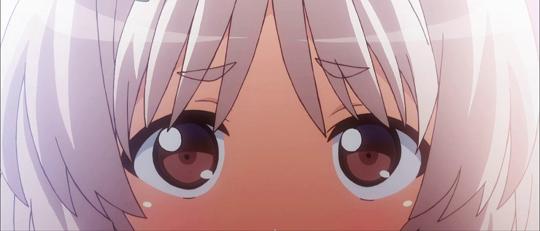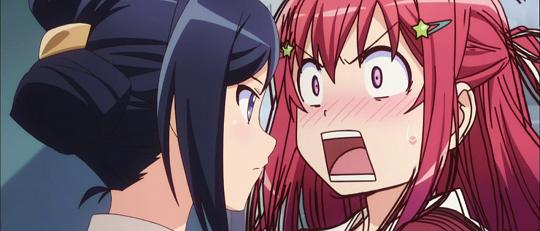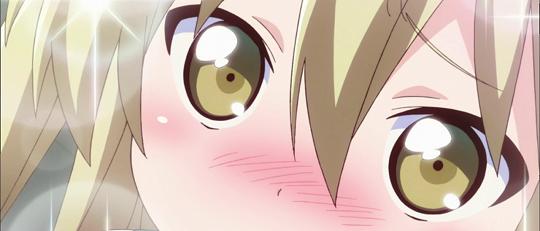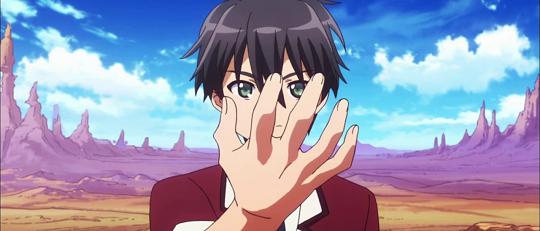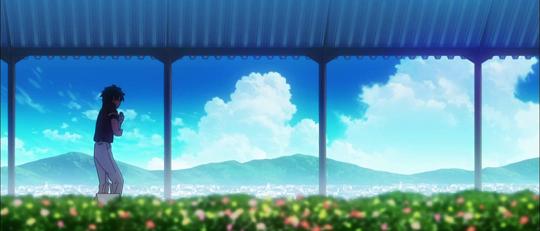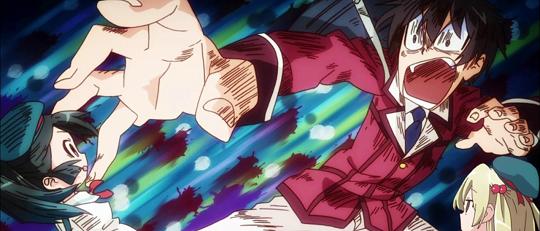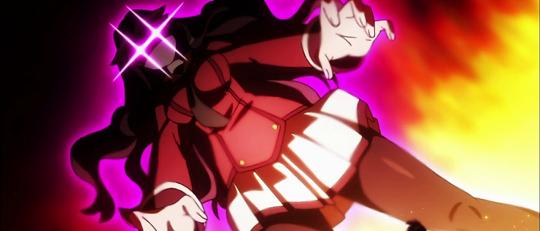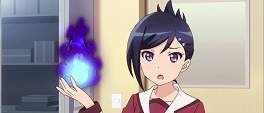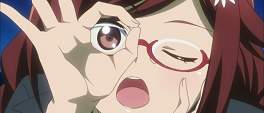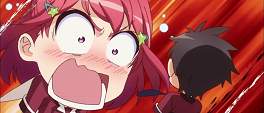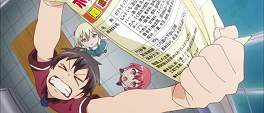There’s a character in Inou Battle, not a main character mind you, he’s barely even a secondary character really, but he says something in the series’ ninth episode that more or less sums up my feelings for it:
[I’m] just your average, everyday reader, who wants to see something interesting or enjoyable
You and me both tertiary character man. Inou Battle wa Nichijou-kei no Naka de (When supernatural battles become commonplace) sells itself in its title and in its first episode as teenagers suddenly gaining supernatural powers and then duking it out. Chronicle in anime form essentially. Only the “battles” of the title aren’t at all commonplace because they don’t happen at all until the very last episode; instead of these battles we get a gorgeously presented but utterly rote campus love comedy.
Ordinarily that wouldn’t be much of an issue, except this is by Trigger. The same Trigger that charmed the world with Little Witch Academia and went balls-to-the-wall with Kill La Kill. Sure Inou Battle looks phenomenal with its wonderfully expressive characters and snappy sense of motion in more or less every shot, but swilling around in the harem “genre” hardly seems a fitting continuation for a studio that engendered so much promise in its fans. Kill La Kill may not have shaken the world but at least it was different.
Make no mistake then, this is a harem setup from start to finish which makes some people’s confusion over the series’ outlook rather odd. When one hundred percent of the on-screen, main character females are warm and fuzzy for the only on-screen, main character male, it doesn’t matter how you contextualise or rationalise those character’s feelings, that’s straight down the waterslide into the self-insert splash pool.
The culprit here is July (or Jurai depending on which episode’s romanisation of his name you believe), a dyed in the wool chuunibyou - 8th grader syndrome - whose knowledge of obscure topics, overuse of the word “turbid” and serial do-gooder means that it isn’t long before fellow literature club members and XX chromosome carriers Tomoyo, Chifuyu, Hatoko and Sayumi are blushing like someone pointed out they’re wearing odd socks. From a conceptual point of view having someone with chuunibyou actually gaining the kind of powers they ostensibly long for is a fascinating hook and one that the series sporadically riffs off with credible comedy. It’s disappointing then that the drab romantic plotlines - each girl gets not one, but two focus episodes to fawn uncontrollably over the dunderheaded lead - take the fore.
But! But here’s the rub. As the series progresses, one gets the impression that pushing the supernatural battles out of the story is not only intentional but part of some grand master plan. Perhaps best illustrated with the eighth episode that for three quarters of its runtime abandons July and his cadre of doe eyed lackies, focusing instead on the reasoning and context behind their supernatural powers. Now instead of July feebly yammering on about sin and darkness we get the actual story. Fairy war, battle royale, secret institutions, clandestine super weapons, it’s all there and has echoes of everything from Nanoha to Railgun, but all too quickly the series is back to “Let’s go to the pool! Oh look at my bikini!”
In a sense then the series seems to want to be a self-satire of the type of story that chuunibyou pulls so keenly from with its magical powers, dark portals and the like. By normalising those powers and making July seem delusional even in the face of evidence of what he’s jibbering about, it’s potentially a message about the genre as a whole becoming commonplace. The problem with this (and I’m paraphrasing Movie Bob here on his brilliant tear-down of Sucker Punch) is that doing a satire of a stale genre - magical powers / chuunibyou fodder - with an equally stale genre - campus love comedy - is very hard to do, the trick being to point out the bad while making a better version of it. And Inou Battle doesn’t achieve that.
It gives it a jolly good try but it slowly collapses in on itself by, for instance, having Mirei in the second episode make the quip:
Do you regard me as an enemy because my breasts are bigger? If that’s the case, I can only say you’re too shallow. Does a woman’s caliber grow smaller with her breast size?
and then having oh so unsubtle jiggle animations for all of the girls, protagonist and cameo, swimsuit or no.
What the series does achieve though, and in outstanding fashion, is a coruscating look at chuunibyou itself. Helped along by some choice monologues from July and company and culminating in an absolutely blinding tirade by Hatoko, voiced by the phenomenal Sayori Hayami, it’s something of an irony that Inou Battle seems to have a better handle on what makes those with chuunibyou tick than, for instance, series that use the syndrome as its namesake. In that sense you have the full spectrum right here: the sufferer, the enabler, the recovering addict, the indifferent and the curious.
In that regard the series is a fascinating watch because it puts a different spin on what is slowly becoming an overused personality trait. It’s a shame then that it’s lost in the technicolour quagmire of a middling school love narrative. Middling because the central pairing is so obvious and the other pairings (Mirei excluded) so forced. Middling because it ramps up the squick factor by having July proclaim himself a lolicon only to have not one, but two middle schoolers ready to profess their undying love for him. The dismantling of chuunibyou seems like much more fertile ground and sections like the power naming (although they missed a trick by not naming Tomoyo “Brighter than the tsun”) or “Bloody vivre” skits held some of the series’ best humour.
Instead, Inou Battle wa Nichijou kei no Naka de ends with no resolution to the romantic polygon and an almost apologetic battle between superpower users - arguably what the opening animation and introductory episodes pitch the series as. All of this wrapped up with Trigger’s gorgeous styling coupled with some bizarre Evangelion references as well as some not-so-subtle set-dressing that reminds us that yes, they did Kill La Kill. There are elements to recommend the series on - the chuunibyou examination and a possible satire of the genre(s) that fuel it being the main one - but as a package the series leaves an awful lot to be desired and the overriding impression is that of a studio phoning it in, making the best of a humdrum series rather than going full bore.

